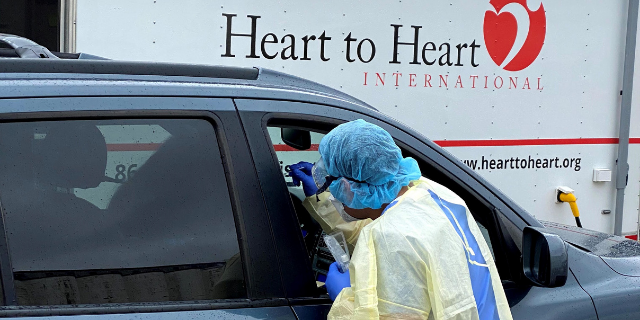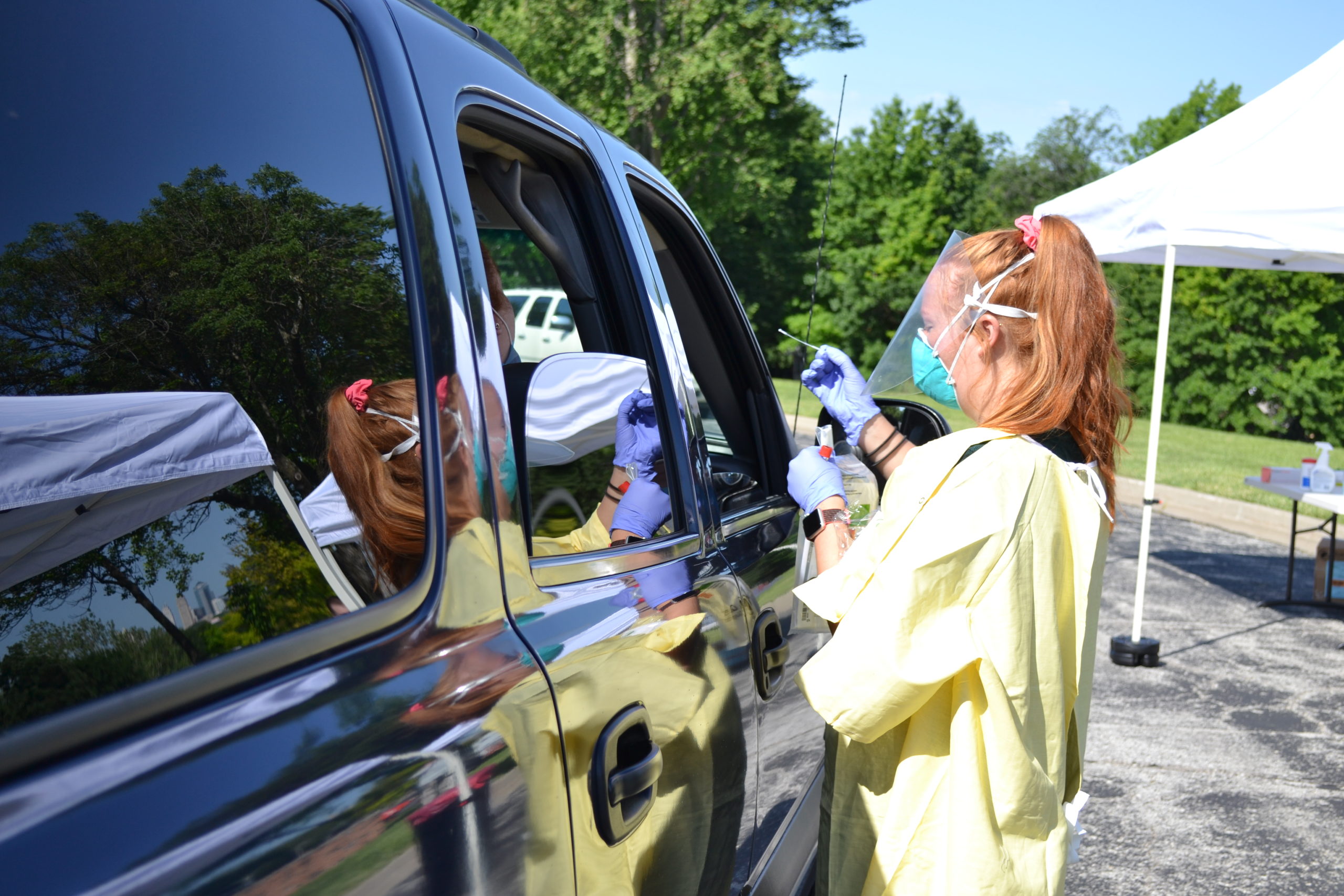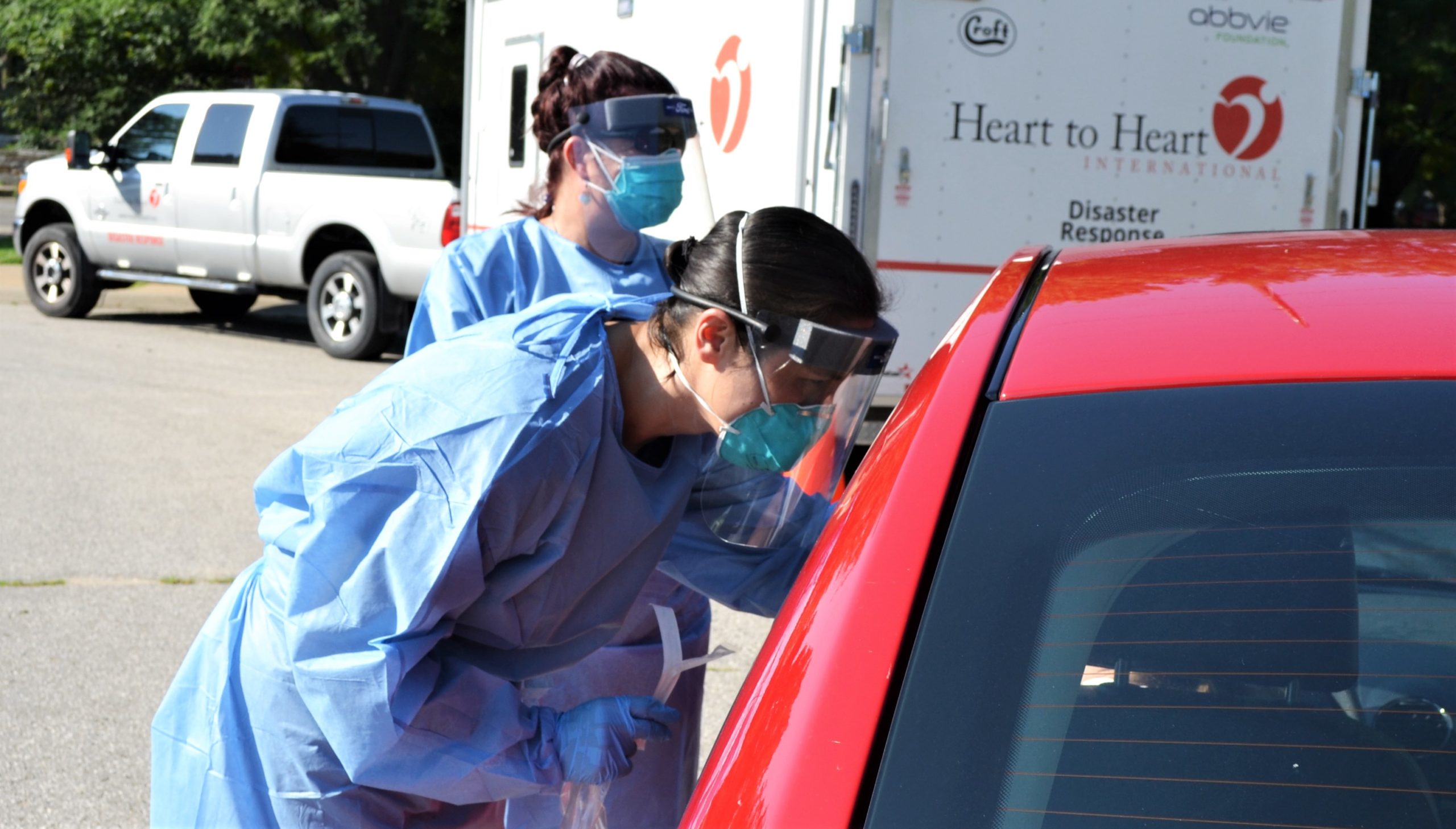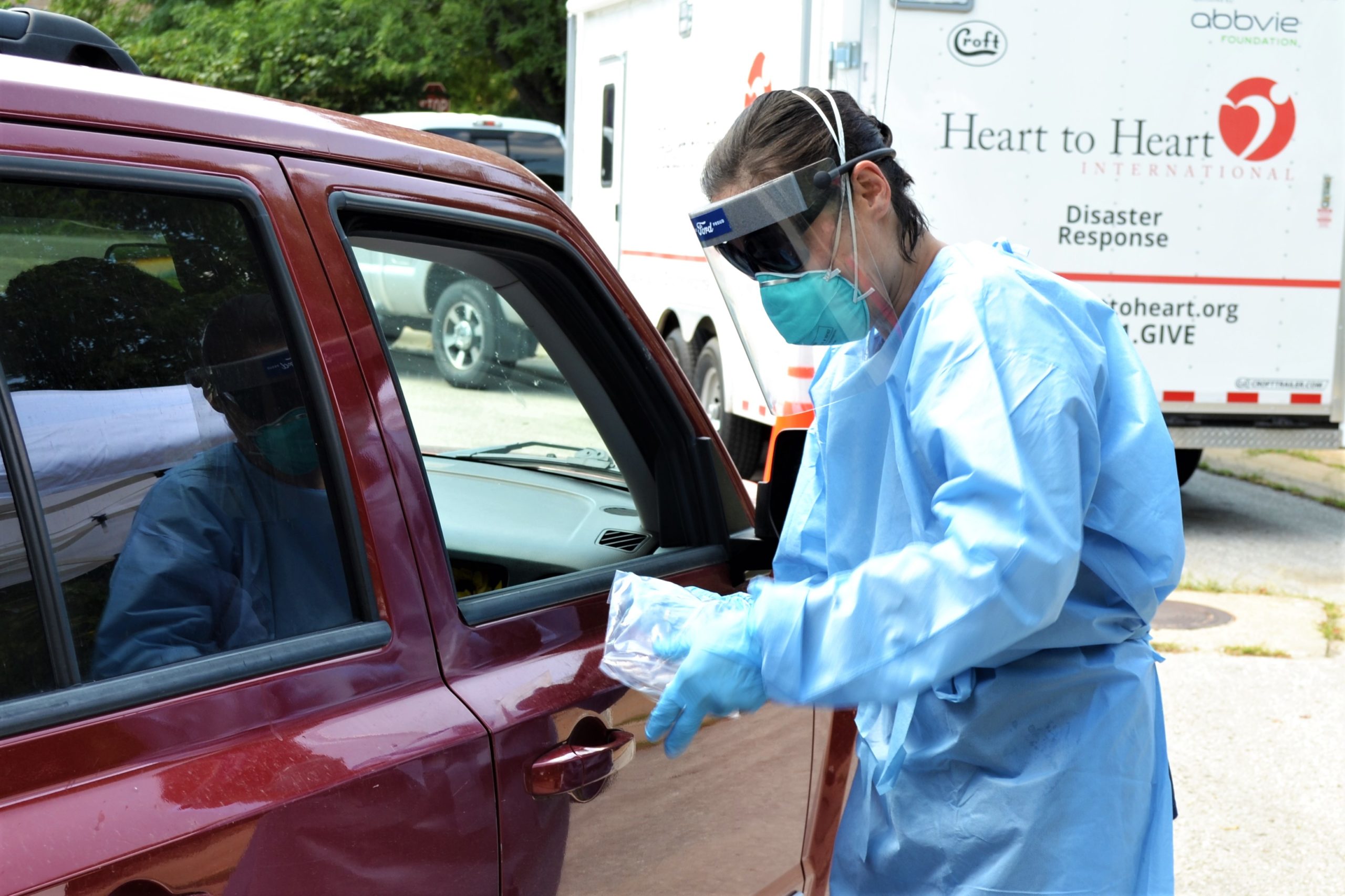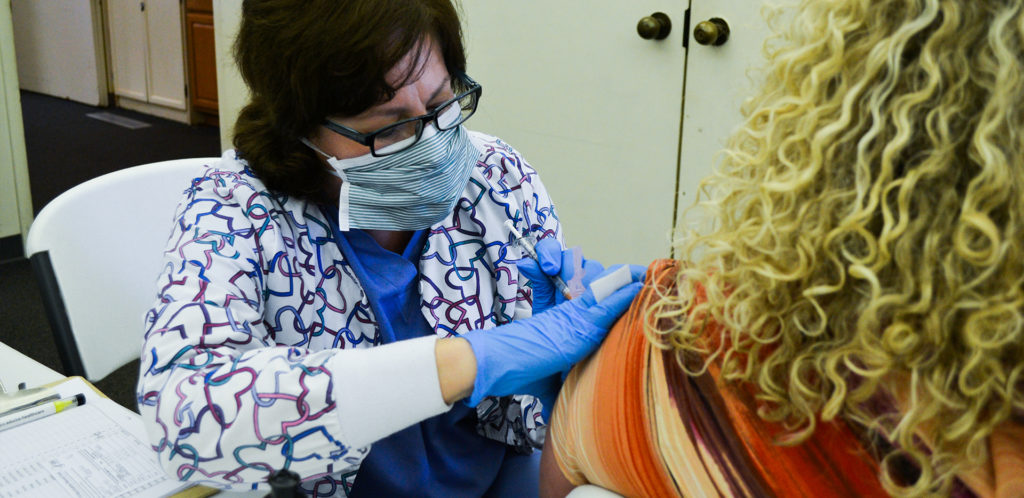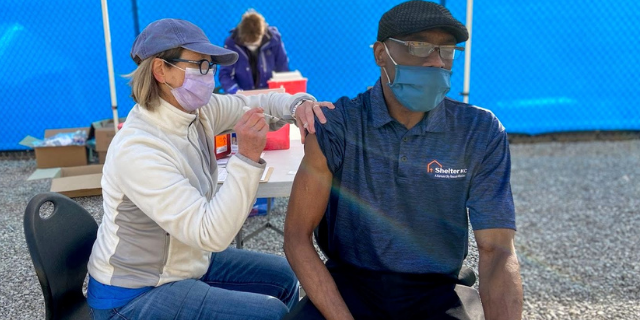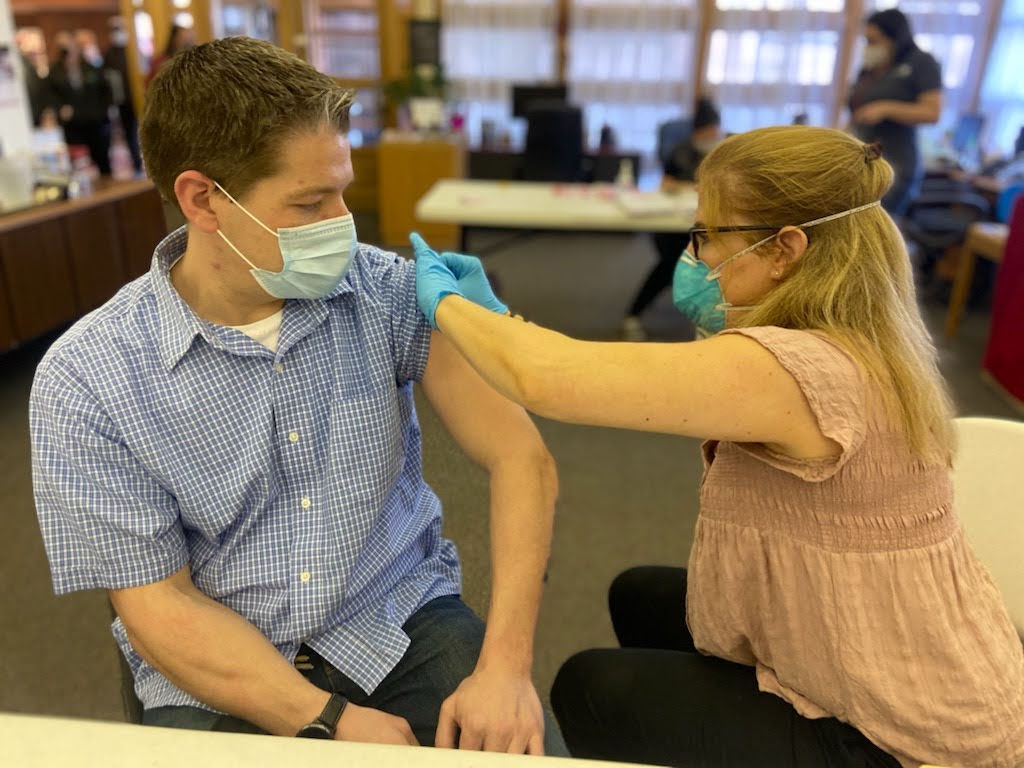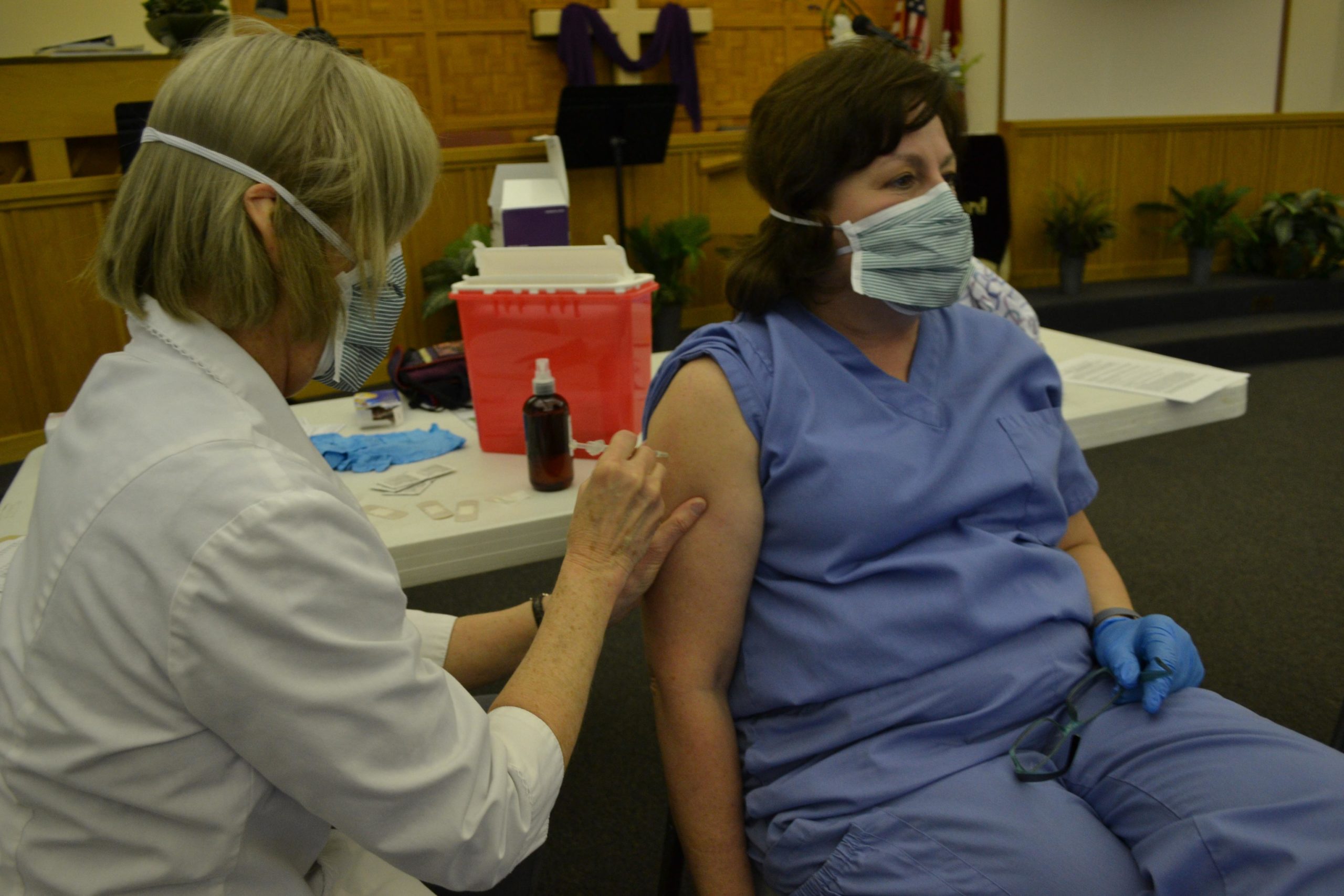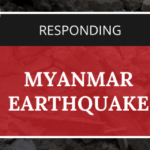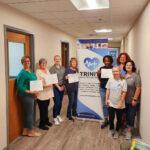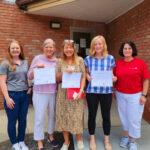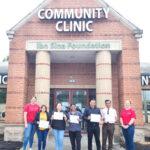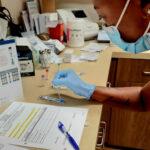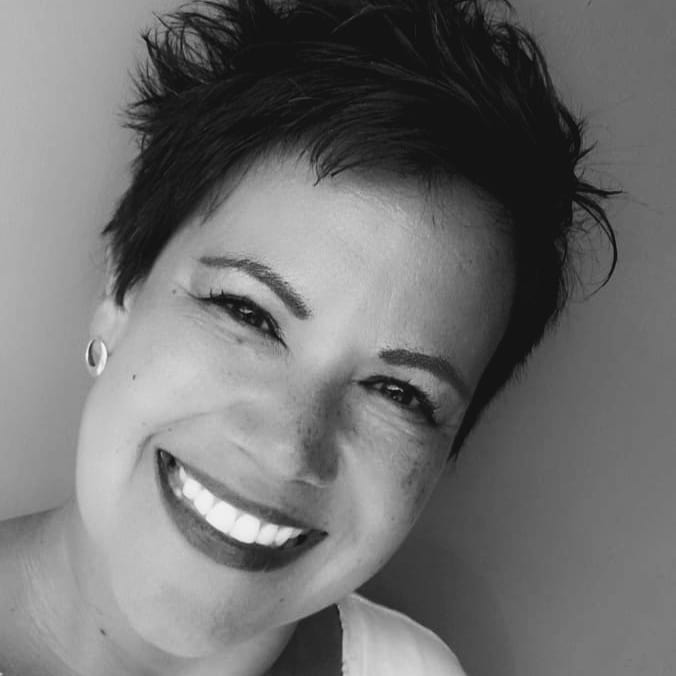
Today, we are offering a behind-the-scenes glimpse at our work with a post written by one of our Event Site Coordinator, Celeste Lupercio. Celeste joined the Heart to Heart International team in the middle of the pandemic, helping facilitate our testing and vaccination programs. We are so grateful for all the work Celeste does to ensure those people who need it most have access to health through COVID-19 testing and vaccinations. Here is her story:
College basketball is very important in Kansas City. The NCAA was born here, the National Association of Basketball Coaches and NAIA are headquartered here. The sport was born just 45 minutes away. I work at The College Basketball Experience (The CBE), the official hall of fame for men’s college basketball located in Kansas City. I am also on the National Events Ambassador Team (NEAT) for the Kansas City Sports Commission (KCSC). NEAT supports all of the events KCSC organizes when all of the college basketball tournaments are in Kansas City. In March 2020, the MIAA tournament played through before the NEAT team hurriedly gathered to discuss how the city might handle the impending pandemic. We had activations set, pep rallies planned, and tens of thousands of visitors were all over the city. On March 12, the Big 12 tournament was on day two before the NCAA, on advice from the World Health Organization and Centers for Disease Control officially shut down tournament play across the country. Early the following week, The CBE announced its temporary closure.
I was stunned the pandemic made its way to Kansas City. It felt so foreign; and I certainly didn’t think the shut-down would last very long. I have friends in all aspects of the hospitality industry. We were texting each other, meeting up for coffee or cocktails, chatting online. What was happening? How long would this last? How would this affect us? I could not believe how quickly some would have the terrible answer. Over half of my friends found themselves without a paycheck in less than a month.
The support among all of us in our industry was immense, but so was the realization that our reality was about to quickly change. Many were up for some serious financial and emotional challenges. By summer 2020, I started reading about the development of COVID-19 vaccines. I learned there was a lack of minorities and people over 40 participating in these clinical trials. The University of Kansas Health System and Children’s Mercy Hospital were collaborating on a clinical trial to test AstraZeneca’s vaccine right here in Kansas City.
As I chatted with my friends who are unemployed from hotels, restaurants, attractions, I thought, “Participating in a vaccine clinical trial is the least I can do.” I was blessed to have an employer who retained me, so this was what I could do was to contribute to the solution. Vaccination was the only thing that could bring all of my friends, my beloved Kansas City restaurants, and favorite attractions back to life.
I had a wonderful Nurse at the clinical trial, JD. He gave me all of the information I needed to understand what my participation would entail. I qualified for the trial because my niece was living with me and was an essential worker, and I was working COVID-19 testing events. Therefore, I was at a fairly high risk for contracting COVID-19. I went in regularly for tests so they could establish my health status before I was vaccinated. This vaccine requires two doses. I honestly thought I’d gotten the placebo because I did not have site pain. I also had no side effects. In March I was given an opportunity for vaccination and I “unblinded” myself from the study. I was sure surprised to learn I’d been fully vaccinated since December 3! I’m still a part of the trial, they’re still testing my blood and they check in with me weekly about how I’m feeling. I’m feeling great.
Meanwhile in November I’d learned Heart to Heart International (HHI) was providing free COVID-19 testing across Kansas City. People were struggling to find testing sites, struggling with insurance and out-of-pocket payment for tests. Yet HHI was out there, making it convenient and free.
I wanted to help. I went to work eight days after applying. HHI had a lot of work to do and they needed as many qualified people as they could get on board quickly. I have worked many large-scale events, yet I was very impressed with the well-oiled machine HHI had developed with drive-through testing. My mom was not happy with me taking this job. She was too worried about my safety. But I promised her I would take every precaution. On my first day, one of the first cars through my line had a sweet older man. He was so appreciative we were there. He thanked me for the risk I was taking, and he gave me a finger rosary. I immediately sent a picture to my Catholic mother to let her know it would be okay.
My goodness, some of these events were unbelievable! Cars snaking around the parking lot, down the street, on to a second street. In a three-hour testing event, my Fitbit logged over 15,000 steps. We didn’t have to walk that far from the cars to the table to get a test kit, but it sure added up quick. The weekend before Thanksgiving we had 1,000 people register for testing. We certainly were not prepared or staffed for that. But not too long after the event started, several members from HHI’s executive staff and other roles showed up. Talk about learning on the fly! It was great for them to see just how many people relied on and appreciated what HHI was doing for the community.
In January, we realized it was too cold for drive-through testing. I offered to help find venues where we could have indoor testing events. I drove all over the city, completing walk-throughs to find the ideal locations. An incredible number of community partners wanted to help be a part of the solution. We lost a few weeks in the process, but soon I’d established locations for testing throughout the week, for several months of events.
We soon suspected HHI would be asked to help with vaccinations. I identified testing venues that would also work for vaccinations, and with the help of suggestions from my hospitality friends, I got some new ideas about venues to approach. Again, I was pleased with the response from the community.
The distribution of vaccines started slowly. HHI was asking, but they weren’t coming. It was okay, I still had more work to do. In line with our mission, I was seeking to find those who needed our help most. We identified there were people over age 65 who had fallen through the cracks. Most were living independently, and completely disconnected digitally. No email, no social media involvement, etc. I found senior service resources, which connected me to senior services, agencies, and independent living communities.
Our first collaborators were Northland Neighborhoods, Inc and Northland Shepherd’s Center. Together, they called 1,000 people. In three days. That’s how fast it all happened! Of those 1,000 they found 130 who still needed a vaccine. Honestly, I could tell they were disappointed those calls did not yield more, but this was great news! This meant the other 870 people who wanted vaccination got it. More importantly, we’d found those people who’d been overlooked.
Even more so than the very appreciative people at our testing events, the elation, the relief, the gratitude at our vaccination events – it makes all of the effort more than worth it.
Meanwhile, I’d been volunteering at a warming shelter for the homeless in downtown Kansas City. Because of the pandemic, more people are jobless and as a result homeless. I’d never volunteered with the homeless, and I was a little nervous. My role was to greet them after they were checked in. I escorted them to their cot, and took their order for whatever they needed. Blankets, clothing, hygiene products and more had been donated. I don’t know why I was always so scared of homeless people. They are people. And they were thankful. They were emotional. They were kind. The best part about knowing I was fully vaccinated was for those few people who were really upset. I asked if they needed a hug, and I gave them a hug. A long and assuring hug.
The Johnson & Johnson vaccine requires only one dose, which made it perfect for use with the homeless population. I was so excited when HHI received the J&J vaccine for use at the very shelter I had been volunteering at. I offered to walk around and talk to people about getting a vaccine. Many were skeptical. Some I could immediately tell were not going to opt in. Others just wanted to know more about it. Who better than someone who’d taken part in a clinical trial? As I walked them to the registration table, their pace would quicken, they’d become more animated; and when they were in recovery right after their vaccination, they were elated and very thankful.
We’ve been having vaccination events for about a month now, and it is inspiring to me to see how the community is coming together, to see how many people are making the socially responsible choice to get vaccinated, and to see the light at the end of the tunnel. We have many more underserved populations to help. I’m ready for it. I am so proud to work for Heart to Heart International, and thankful for what they are doing in my community.
Celeste Lupercio is the Senior Director of Sales, Marketing and Events at The College Basketball Experience. She has been in this industry since 2012. Prior to her career change, she spent 16 years as a Case Manager at a psychiatric hospital for children. Her roles there also included Medical Records supervisor and the hospital’s Safety Chair which included Infection Control. She serves on the Board for the West 18th Street Fashion Show and Camp Fire-Heartland; is an Ambassador for Kansas City Kansas Chamber of Commerce, and volunteers annually for the American Royal World Series of Barbecue.
More Stories:
- Myanmar Earthquake: Disaster Assessment Team Story
- Lab Week: On-site Testing Improves Chronic Disease Management at Trinity Health Center
- Lab Week: New On-Site Lab Streamlines Treatment for Flint Patients
- Lab Week: Ibn Sina Foundation Expands Access to Care with Point-of-Care Testing
- Lab Week: Bringing Point-of-Care Lab Services to the Good Neighbor House

